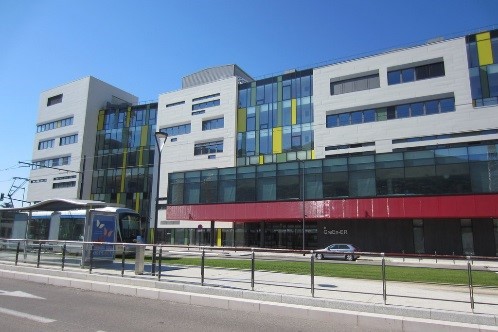- Share
- Share on Facebook
- Share on X
- Share on LinkedIn
Participants: GAEL (Leader Daniel Llerena), CRESSON, G2ELAB, LIG, LNCMI, PACTE
The objectives of this research front are to propose technological solutions, original devices and modes of collaborations specific to district communities (inhabitants of a building, employees of an office building, communities of an energy system, etc.). These scientific challenges will be addressed by multiple approaches including “Living Labs”, experiences with inhabitants and case studies. While each of them will be representative of a community with its own research questions, all of them as a whole will be able to characterize a generic district.
These Living Labs and case studies are:
- Living Labs (in monitored buildings at the Presqu’île of Grenoble) and case studies focused on the conversion from an individual inhabitant behavior to a collective logic at the building level. This study will take into account the comfort and the needs of the users, and the possible evolutions of the energy sources (particularly in connection with the energy’ uses in the neighborhoods). In interaction with other research fronts, these field studies will analyze the technological and socio-economic mechanisms required to support the dynamics of the communities within a district system.
- A case study on a larger scale where "representative" actors (e.g., a laboratory, a company, a system manager, etc.) have to instrument the behavior flexibility of actors in order to guarantee the energy fluidity of the eco-district. This analysis will be led around the laboratory LNCMI, which represents a “mixed actor" (that is an inhabitant but at the same time a producer of energy) who could mutualize its resources.
The main challenges is to develop and to share, according the technological opportunities, knowledge on the actor’s flexibility, their needs and offers of neighbors’ adaptation.
- Experiments and simulations of the interactions between actors (residential and tertiary users, facilities, firms) according coordination mechanisms
- The design of interactive systems for explanation and coaching for individual users, communities and institutions (with Research Front 1)
- The design of decision-making tools so that the various actors can be involved in the community and eco-district governance

Publications
Hélène Haller, Van Bao Nguyen, Gilles Debizet, Yann Laurillau, Joëlle Coutaz, Gaëlle Calvary, 2017, Energy Consumption in Smarthome: Persuasive Interaction Respecting User’s Values, dans Proc. of the 9th IEEE International Conference on Intelligent Data Acquisition and Advanced Computing Systems: Technology and Applications (IDAACS), IEEE Pub., pages 804-809. 2017.
Penelope Buckley, Daniel Llerena, 2017, Demand response as a common pool resource game: Nudges versus Prices, Conférence annuelle de l’AEE (Association des Economistes de l’Energie), 28-29 novembre 2017, Paris.
P. Buckley. Incentivising households to reduce electricity consumption: A meta-analysis of recent experimental evidence. Associazione Italiana Economisti Dell’Energia. 2ème AIEE Energy Symposium, nov 2017, Rome.
P. Buckley & D. Llerena. Demand response as a common pool resource game: Nudges and peak pricing. Association des Economistes de l’Energie, conférence annuelle, dec 2017, Paris.
M. Pappalardo, T. Reverdy. Improving the energy performance in service building through collective learning and regulation: how socio-technical dependencies are convened in a deliberative space. 4th Energy and Society Conference : « Energy transitions in a divided world », Sep 2018, Exeter, United Kingdom.
P. Buckley & D. Llerena. Demand response as a common pool resource game: Nudges and peak pricing. World Congress of Environmental and Resource Economists, jun 2018, Goterborg.
P. Buckley & D. Llerena. Demand response as a common pool resource game: Nudges and peak pricing. International Association for Energy Economics, jun 2018, Groningen.
P. Buckley. Incentivising households to reduce electricity consumption: A meta-analysis of recent experimental evidence. British Institute for Energy Economics, sep 2018, Oxford.
Buckley, P., Roussillon, B., Teyssier, S.. Loss aversion framing to incentivise small efforts for repetitive tasks. University of Kent. Séminaire externe, sep 2018, Canterbury.
Penelope Buckley, Daniel Llerena. Demand response as a common pool resource game: Nudges or peak pricing. NEWTS Workshop. Sciences Po Grenoble, May 2019. Grenoble, France.
Penelope Buckley, Daniel Llerena. Demand response as a common pool resource game: Nudges or peak pricing. Journée Scientifique ULHyS, Université de Lorraine. June, 2019. Nancy, France.
Penelope Buckley, Béatrice Roussillon, Sabrina Teyssier. Bonus and penalty incentives for small efforts: An experiment. Research Seminar - PErSEUs - Université de Lorraine, Feb 2020, Metz, France.
Penelope Buckley, Béatrice Roussillon, Sabrina Teyssier. Gain and Loss framing of incentives: encouraging individuals to provide a repetitive effort for small rewards. 10th International Conference of the French Association of Experimental Economics (ASFEE)- Université de Toulouse, Juin 2019, Toulouse, France.
Penelope Buckley. Incentivising households to reduce electricity consumption: A meta-analysis. Forcoming Ecological Economics.
- Share
- Share on Facebook
- Share on X
- Share on LinkedIn